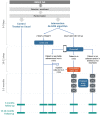Combining green cards, telephone calls and postcards into an intervention algorithm to reduce suicide reattempt (AlgoS): P-hoc analyses of an inconclusive randomized controlled trial
- PMID: 30707710
- PMCID: PMC6358079
- DOI: 10.1371/journal.pone.0210778
Combining green cards, telephone calls and postcards into an intervention algorithm to reduce suicide reattempt (AlgoS): P-hoc analyses of an inconclusive randomized controlled trial
Abstract
Background: Brief contact interventions (BCIs) might be reliable suicide prevention strategies. BCI efficacy trials, however, gave equivocal results. AlgoS trial is a composite BCI that yielded inconclusive results when analyzed with Intention-To-Treat strategy. In order to elicit intervention strengths and weaknesses, post-hoc analyses of AlgoS data were performed.
Methods: AlgoS was a randomized controlled trial conducted in 23 French hospitals. Suicide attempters were randomly assigned to either the intervention group (AlgoS) or the control group (Treatment as usual TAU). In the AlgoS arm, first-time suicide attempters received crisis cards; non first-time suicide attempters received a phone call, and post-cards if the call could not be completed, or if the participant was in crisis and/or non-compliant with the post-discharge treatment. An As Treated strategy, accounting for the actual intervention received, was combined with subgroup analyses.
Results: 1,040 patients were recruited and randomized into two groups of N = 520, from which 53 withdrew participation; 15 were excluded after inclusion/exclusion criteria reassessment. AlgoS first attempters were less likely to reiterate suicide attempt (SA) than their TAU counterparts at 6 and 13-14 months (RR [95% CI]: 0.46 [0.25-0.85] and 0.50 [0.31-0.81] respectively). AlgoS non-first attempters had similar SA rates as their TAU counterparts at 6 and 13-14 months (RR [95% CI]: 0.84 [0.57-1.25] and 1.00 [0.73-1.37] respectively). SA rates were dissimilar within the AlgoS non-first attempter group.
Conclusions: This new set of analysis suggests that crisis cards could be efficacious to prevent new SA attempts among first-time attempters, while phone calls were probably not significantly efficacious among multi-attempters. Importantly, phone calls were informative of new SA risk, thus a key component of future interventions.
Conflict of interest statement
The authors have declared that no competing interests exist.
Figures
References
-
- World Health Organization; WHO | Suicide data [Internet]. WHO; 2016. [cited 2016 Dec 12]. Available from: http://www.who.int/mental_health/prevention/suicide/suicideprevent/en/
-
- Hawton K, Witt KG, Taylor Salisbury TL, Arensman E, Gunnell D, Hazell P, et al. Psychosocial interventions for self-harm in adults In: Cochrane Database of Systematic Reviews [Internet]. John Wiley & Sons, Ltd; 2016. [cited 2016 Dec 21]. Available from: http://cochranelibrary-wiley.com/doi/10.1002/14651858.CD012189/full - DOI - PMC - PubMed
Publication types
MeSH terms
LinkOut - more resources
Full Text Sources
Research Materials
Miscellaneous



